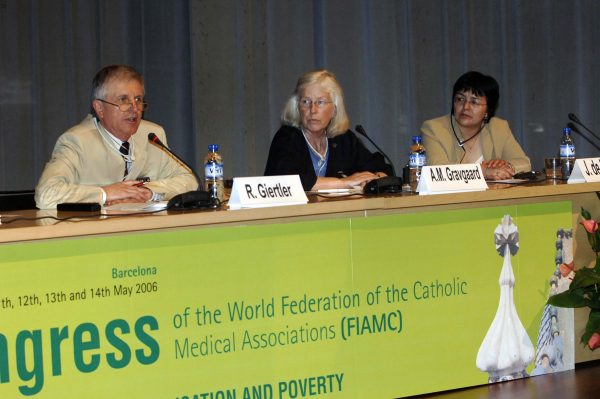Rudolf Giertler, FEAMC Congress, Porto, October 2016
Legal provisions at the beginning and end of life in Germany / Les règlementations légales au début et à la fin de la vie humaine en Allemagne / As regulamentações legais no princípio e no fim da vida humana na Alemanha
Summary /Résumé/ Resumo
With the reunification of Germany in 1990, it was necessary to create a uniform legal regulation for abortion. Until then, in the former socialist part of Germany, the so-called deadline regulation was used, while in the Federal Republic of Germany, the indication solution was required by law. The deadline regulation gave every woman the right to have an abortion by her own responsibility without giving a reason up to the 12th week of pregnancy. Regarding the indication solution, an abortion was only possible if the pregnancy was a threat to the health of the woman. In some cases, social emergencies were considered, which could also adversely affect the health of the woman. Because these two laws were not compatible, it was necessary to look for a third way forward. It stipulated that an abortion was only unpunished, when an advice center for pregnant women was consulted in advance. This advice should especially help and support women, but also couples and families in conflict situations and encourage the woman to continue the pregnancy. On the other hand, it is the woman who has to make her own decision. The consultation has to be documented and returned to the woman and is the legitimacy to carry out an abortion in the end. With the approval of the German Bishops Conference, the German Caritas Association has been involved in this process from the beginning. The Catholic Church saw an important humanitarian task here. Finally, there were mostly young pregnant women who needed urgent help and assistance. But how many women who visited the counseling centers of Caritas, ultimately did not carry out an abortion and opted for their child, cannot be said with certainty. There are no clear statistics.
The demand of Pope John Paul II to stop the consultations of pregnant women by Caritas consulting centers was for the Catholic Church in Germany completely incomprehensible. On the other side, a counseling result which legitimizes a possible abortion as a final consequence was unacceptable for the Pope. The counseling bill represented to him rather a license to kill. After years of difficult discussions, the German bishops decided to maintain pregnancy conflict counseling in its current scope in November 1999, but without issuing a counseling certificate. The Caritas counseling centers and the support possibilities are still made use of by pregnant women but the often decisive first consultation for the continuation of the pregnancy is quite rare.
Unfortunately, Germany is among the countries with the lowest birth rate worldwide. In this context it is particularly unfortunate that in spite of the required counseling for pregnant women and subsidization about 200,000 abortions are performed every year. It is to be feared that with improved prenatal diagnosis, particularly of genetic diagnostics, these figures will rise even more. Thus, for example, the birth rate of children with Down syndrome declined by 90% through the early detection of trisomy 21 gene in the blood of pregnant women.
So-called late abortions of disabled or malformed children are generally allowed in Germany. The pre-implantation genetic diagnosis is governed by a special law, the in vitro fertilization by the Embryo Protection Act. In these cases detailed education and informing of women and their partners are required.
The Embryo Protection Act also prohibits surrogacy, the implantation of foreign ova and Embryo Adoption. Implantation of cryo preserved oocytes is used only when it is medically justified, e.g. in women with cancer who want children before commencing with chemotherapy. So-called social egg freezing is being discussed, but it is not practiced in Germany.
In recent years there has also been an intensive debate on the problems at the end of life in Germany. There were three main questions:
- Living will or advance directives documents.
- The termination of life prolonging treatment of dying patient.
- Self-determination at the end of life: Dying in dignity, Euthanasia, assisted suicide. It might be surprising to know that more than 70% of German people agree with both euthanasia and assisted suicide. Many people are afraid getting mental or physically disable and helpless. However, it is often the fear of severe pain and the fear of dying alone and losing personal dignity which leads to requesting euthanasia or assisted suicide. In some cases, the critical attitude towards the high technology in medicine also plays a role.
Current statistics show that there are around 200 to 300 assisted suicides and about 10,000 suicides per year in Germany (statement of the Association of Christian doctors to legal regulation of assisted suicide).
- Living will and advance directive
The law of advance directive was legislated in Germany in 2009. It regulates and enforces in particular the patient’s autonomy, which has to be respected at the end of life and makes the advance directives legally binding. The living will document plays a major role in the doctor’s decisions with regard to unconscious, critically ill or dying patients because they have to agree with the patient’s expectations. Generally, only standard therapies are allowed. Normally the patients ask for the removal of life sustaining measures in a situation for terminal illness, for an effective pain therapy, if this is necessary, and best possible palliative care. Basic care must be guaranteed in each case.
The advance directives should be kept at the doctor’s office and at the personal papers of the patient, but can also be stored with a notary or at the district court.
In most cases, advance directives are associated with a health care proxy for close relatives or friends of the patient. This document is identical to the living will document and should underline the needs and expectations the patient has written down in his/her advance directives. The patient or the power of attorney authorizes the appropriate people to have access to patient records and relieves the physician of medical confidentiality.
The living will document and the health care proxy are legally binding without notary attestation. However, they should be updated by the patient regularly, possibly every two years, and confirmed by his/her signature.
Although the advance directives are legally binding for he physician, there are many problems in everyday work. Problems arise when the patient’s provisions do not .agree with the current illness situation. Here, consultations are required with the health care proxy representative or the state-appointed person in charge. If there is no agreement between the content of the advance directives and the opinion of t he physician or the patient’s caregiver, a court has to be consulted.
Advance directives not only apply in the context of situations related to the immediate death of the patient but also include patients with severe diseases whose death can occur far into the future. This means that life-prolonging measures have to be finished when the dying phase has yet to begin, but the prognosis is hopeless and there is no chance for improvement. This may be the case in some vegetative state conditions or with severe dementia as well.
In any case, possible treatment options have to be reviewed regularly and medical decisions have to be reexamined critically. In this connection, the so-called clinical ethics committees have increasingly been gaining in importance at many hospitals in Germany. Discussions are held with the therapeutic team to find the best way for the patient to accept his/her actual presumable will.
The patient can revoke his/her living will declaration at any time. He/she can do this in written form, verbally or by using eye, hand or head movements if he/she is not able to write or to speak.
Already in 2004, The Chamber of German Medical Association published guidelines for dying and for critically ill patients. In this paper, the living will of the patient received here also a high importance.
Despite many discussions about advance directives, they are still relatively rare in Germany. The number of patients who get advance directives is currently around 30%.
- Euthanasia
Both the Chamber of the German Medical Association and the parliamentary representatives of all parties are strictly opposed to euthanasia, due to the euthanasia crimes during the time of National Socialism in Germany. In addition, there is a general fear of a “bursting of the dam” with incalculable risks.
In particular, euthanasia might lead to moral pressure on old or disabled people when they feel they have become a financial burden for the family or for society.
Active euthanasia is prohibited by law and is punished by imprisonment and loss of medical license to practice.
- Assisted suicide and the new German law
The Chamber of the German Medical Association was also all the time clearly against the physician-assisted suicide. Corresponding to the medical profession order where it has been written: „doctors must assist patients while respecting their dignity and their will. Killing patients on request is prohibited. It is not allowed to help a patient kill him or herself. The professional code of ethics commits doctors to provide assistance to live and not to die.” (End of the citation)
The Catholic and Protestant Church in Germany also reject any form of assisted suicide.
In the political spectrum, opinions on assisted suicide differed greatly and many politicians demanded the statutory authorization of medical assisted suicide under special circumstances. By the new law, valid since November 2015, commercially-assisted suicide is forbidden and medical assisted suicide is not authorized.
Here the text of the legal paragraphs:
Commercial aid of assisted suicide (1)
Participants who intend to aid in the assisted suicide of another person, by granting, providing or mediating the opportunity as a commercial service, will be punished with a prison sentence of up to three years or a fine.(2)
Exempt from punishment are those participants who do not act In a commercial manner and are either a family member of the person named in paragraph 1 or have close ties to said person.
Maybe this law is not the best one, but it is, in my opinion, the best possible solution.
I would think paragraph 2 is very clear for family members or other persons who are in close connection to the ill patient, on the condition they do not act in a commercial manner (see above). The doctor is not named here. Indeed he could be a family member or in close connection to the patient as well but should manage this problem of relationship with good palliative care.
It is not possible to prevent “mercy killing” at all. In the end it depends on the intuition and ethics of the doctors and other people how they accompany a very ill or dying patient. The most important intention of the law is to forbid commercial suicide and not to legalize doctor assisted suicide.
If the law of physician assisted suicide had found a majority in parliament, it would most likely have led to big conflicts in the medical profession because the medical professional code of ethics, as I stated above, expressly prohibits physician-assisted suicide according to the guidelines of the German Medical Association. Here, civil law would be up against professional medical ethics.
In my opinion, the possibility of assisted suicide might like euthenasia limit the self-determination of the patient more than encouraging it.
- Palliative care
Discussions about terminally ill patients and their self-determination dying have once again brought focus on the importance of palliative care. The intention of palliative care is mainly improving the patient’s quality of life through comprehensive and best possible support. In this case, pain therapy is of particular interest. As I already mentioned above, the desire for euthanasia is mainly stated when dying or seriously-ill patients feel helpless and left alone or suffer from severe pain or other physical or mental anguish and cannot die. In this situation the goal of therapy has to be changed: not to sustain the patient’s life under all circumstances but to relieve his/her suffering as well as possible to improve his/her quality of life. This is valid for fluid and food intake as well, which have to serve primarily to satisfy hunger and thirst and should not be continued as a seemingly indispensable supportive therapy because this may aggravate the complaints of the patients.
Patients in the vegetative state are not dying people and must get all necessary therapeutic applications.
Fortunately, the German government recognized the importance of good palliative care and is willing to promote the construction of palliative care units and hospices, in particular outpatient palliative care service, also in non-urban areas. This is regulated by law, too. But there is still a lot to do: 76% of German people want to die at home, but actually the most people die at hospitals and only 20% at home. On the other sites only 36% of patient get a palliative care, but 90% would need it at the end of their life. This is a big challenge for the future.
Ladies and gentlemen,
my task was to describe the problems at the beginning and at the end of life in Germany. But I think these are not only problems and challenges in Germany alone but in all of Europe and the Western countries as well. Despite existing laws and regulations at the beginning of life and in regard to self-determined dying many questions remain unanswered and open, because medical decisions must be made primarily from the point of view of ethical and moral considerations and cannot be determined by law alone. So we as Catholic physicians share a great responsibility in this field as well.









